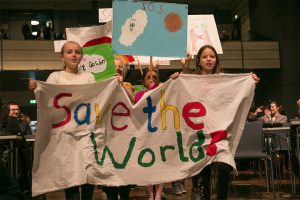Ministers and leaders agreed to step up implementation efforts on reducing short-lived climate pollutants (SLCPs) during a high-level event held on the sidelines of the Sharm el-Sheikh Climate Change Conference (UNFCCC COP 27) in Egypt. Several countries and non-State entities announced pledges to the CCAC Trust Fund, with new commitments totaling USD 6 million.
More than 40 ministers participated in the 15 November Climate and Clean Air Ministerial Roundtable, which serves as the preeminent political body of the Climate and Clean Air Coalition on SLCPs (CCAC).
Roundtable participants, inter alia: took stock of progress since COP 26, noting 2022 has seen a strong start on implementation of the CCAC 2030 Strategy; reaffirmed their commitment to quickly reduce emissions of methane and other SLCPs, including by building on the Global Methane Pledge launched in 2021; and announced new pledges to the CCAC Trust Fund. The CCAC’s new Gender Strategy was also launched, as was the ‘Global Methane Assessment: 2030 Baseline Report,’ which shows methane in the atmosphere has increased significantly.
During the opening segment, John Kerry, Special Presidential Envoy for Climate, US, emphasized that achieving the Global Methane Pledge is key to meeting the goals of the Paris Agreement on climate change, and said the US will invest USD 20 billion to reduce methane emissions. Kwaku Afriyie, Ministerial Roundtable Co-Chair and Minister of the Environment, Science, Technology, and Innovation, Ghana, said reducing SLCPs is one of the surest ways to avoid crossing the 1.5°C tipping point. Csaba Kőrösi, UN General Assembly (UNGA) President, urged including SLCPs in nationally determined contributions (NDCs).
Inger Andersen, Executive Director, UN Environment Programme (UNEP), said USD 150 million is needed by 2025 to deliver on the CCAC 2030 Strategy.
The US, Finland, the Walloon Government of Belgium, Norway, Monaco, the Netherlands, and Switzerland announced pledges, as did and the Sequoia Climate Foundation, on behalf of the Global Methane Hub.
On methane, Canada noted its intent to: help small island developing States (SIDS) reduce their methane emissions; reduce methane emissions from oil and gas companies by 75% by 2030; and contribute CAD 2 million for methane mitigation in developing countries. The UK said its oil and gas industry will reduce methane emissions by 50% this decade. Gabon, Panama, Costa Rica, Bangladesh, and Viet Nam highlighted their national efforts to reduce methane emissions. The World Meteorological Organization (WMO) described an internationally coordinated system using satellites for finding and measuring methane sources in countries. Mongolia and Mali announced they had recently joined the Global Methane Pledge. The Clean Air Task Force highlighted the first Latin American regulations targeting methane in Colombia’s oil and gas sector.
On agriculture, New Zealand noted plans to extend its domestic emissions trading scheme to the agriculture sector by 2025. Ireland urged considering climate justice when addressing food production. The World Resources Institute (WRI) highlighted the role of agriculture in tackling methane emissions.
With respect to heavy-duty vehicles and engines, Jordan and Monaco highlighted shifts to cleaner vehicles. Clean Air Asia mentioned new initiatives to reduce shipping and heavy-duty vehicle emissions, including a programme assessing the clean air performance of ship operators in waters between China and other countries.
Discussing waste, the Netherlands shared its circular economy goals, and Peru noted efforts to develop solid waste as an energy resource.
On cooling, Japan and the Dominican Republic presented roadmaps towards sustainable refrigeration. Togo highlighted efforts to substitute household energy with gas and other alternative renewable sources of energy.
On building momentum for clean air, Oxfam International encouraged taxing the production of oil and gas, creating subsidies for renewable energy, and offering grants and debt-free financing for the energy transition of developing countries. Nigeria said SLCPs are now included in its NDC. Mexico noted inclusion of a 51% reduction target by 2030 for black carbon in its NDC.
Speakers also highlighted: the Asia Clean Blue Skies Program, which seeks to build national capacities to design and implement investment projects with air quality and low carbon benefits; the Waste Hub, which supports efforts to sustain a circular economy approach; the need for youth to have a seat at the table; a proposal to create a CCAC working group on identifying the best technologies to reduce methane; the need to raise awareness on the dangers of methane; and that less than 1% of development aid goes to improving air quality. [Earth Negotiations Bulletin (ENB) Coverage of Climate and Clean Air Ministerial Roundtable]

